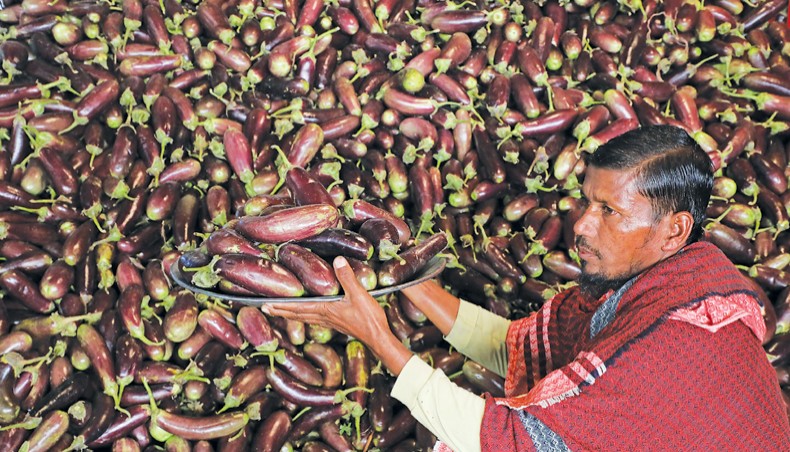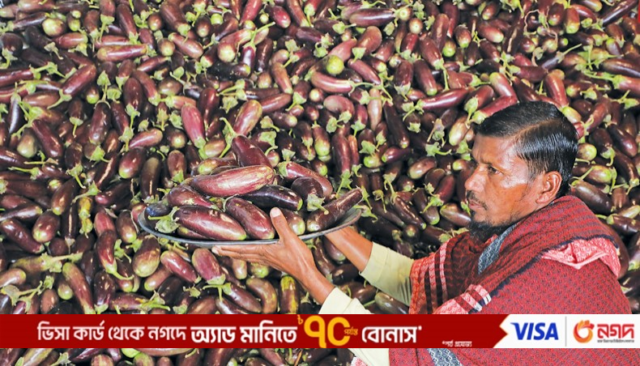
A wholesaler decorates brinjals for sale at Shyambazar in Dhaka. — Sony Ramany
Following the national elections held on January 7, the prices of essential commodities witnessed a further jump, defying government initiatives to curb them, and remained steady at high levels. Experts and economists attribute this surge to a coalition of dishonest businesses and ineffective governmental monitoring systems.
They point out that the essential commodities market is controlled by a few groups of companies, leading to a lack of competition as the key factor driving up prices.
Throughout the past year, most commodities maintained high prices, but vegetables, potatoes, and onions saw an unprecedented increase in November and December 2023, coinciding with the full harvesting season.
Even in February 2024, these elevated prices persist.
Notably, immediately after the elections, rice prices surged by Tk 6-8 per kilogram overnight, despite plentiful Aman paddy production nationwide, and remained high despite government announcements of zero tolerance for hoarding.
Businesses argue that rising operational costs over the past year, driven by fuel price hikes, gas shortages, and taka depreciation against the dollar, have significantly impacted their expenses.
They highlight a 37 per cent appreciation of the dollar and a 300 per cent increase in gas prices over the year as major contributors to the commodity price increases.
Government data reveals that essential commodity prices surged by 30-160 per cent over the past year.
While some global and local factors have influenced these increases, experts argue that prices in Bangladesh far exceed logical levels.
Economist Abdul Bayes attributes the illogical price spikes, particularly in rice, to market failures stemming from oligopolies and syndicates manipulating prices, despite the conclusion of the Aman harvesting season in December.
Bayes advocates for the enforcement of market regulations to ensure stability, noting that temporary market interventions are insufficient.
He criticises the government’s overly accommodating stance towards businesses, distinguishing between a business-friendly policy and one favouring businessmen.
Data from the state-owned Trading Corporation of Bangladesh corroborates the upward trend in prices for rice, flour, lentils, gram, edible oil, sugar, broiler chicken, beef, and eggs in the country’s kitchen markets over the past year.
Specifically, the price of local onions surged by nearly 160 per cent in January 2024 compared to the same month in 2023.
According to data from the Trading Corporation of Bangladesh (TCB), the price of potatoes surged by 63.64 per cent over the past year, reaching Tk 40-50 per kilogram.
Additionally, rice prices increased by up to 8.33 per cent, red lentils by 10.26 per cent, and gram by 11.43 per cent during the same period.
The prices of broiler chicken and eggs also experienced significant rises, up by 25 per cent and 9.41 per cent respectively.
Government data further revealed substantial increases in the prices of garlic, which surged by nearly 85 per cent, and ginger, which rose by over 60 per cent in the past year.
Sugar prices increased by nearly 24 per cent, and almost all spices witnessed price hikes ranging from 40 per cent to 80 per cent.
Ghulam Rahman, president of the Consumers Association of Bangladesh, expressed deep concern over the severe impact of escalating commodity prices on lower and lower-middle-income individuals.
He criticised the disproportionate rise in local market commodity prices compared to the appreciation of the dollar.
Rahman emphasised the detrimental effects of traders’ inflated profit expectations and highlighted the challenges in reducing prices once they have soared.
Rahman urged the government to take decisive measures to combat inflation, warning that failure to do so would perpetuate unaffordable commodity prices.
He stressed the importance of fostering market competition to safeguard consumer interests.
Responding to the government’s recent announcement of zero tolerance against hoarding and extortion in goods-laden trucks on highways, economist Abdul Bayes stressed the critical need for political commitment to address extortion.
He noted that influential individuals are often involved and emphasized the necessity of identifying and penalizing those responsible for price hikes.
M Asaduzzaman, former research director of the Bangladesh Institute of Development Studies, echoed concerns about market manipulation and underscored the challenge of implementing government measures amid strong links between manipulators and centres of power.

He emphasised the urgency of addressing the dollar crisis and increasing people’s income to alleviate the burden of high commodity prices.
Asaduzzaman proposed the establishment of a smart agriculture supply chain and the mandatory disclosure of stock information by mill owners and wholesalers to prevent hoarding.
K M Layek Ali, secretary-general of the Bangladesh Auto Major and Husking Mill Owners Association, attributed price hikes across various sectors to increases in fuel prices. He highlighted the direct impact of rising transport costs, labour wages, and electricity bills on rice prices.





